Comparative Analysis: Inheritance Laws in Malaysia (Civil and Islamic)
VerifiedAdded on 2022/09/23
|7
|1489
|35
Essay
AI Summary
This essay provides a comparative analysis of inheritance laws in Malaysia, focusing on the differences between the civil and Islamic legal systems applicable to non-Muslims and Muslims, respectively. The essay explores the laws of testacy and intestacy under both systems, examining the requirements for valid wills and the distribution of property in the absence of a will. It highlights the impact of religious conversion on inheritance rights, particularly when a non-Muslim converts to Islam, and the potential conflicts that may arise. The essay discusses the concept of Hibah (gifts) as a tool for managing property distribution and mitigating conflicts, as well as the role of mediation and legislative reforms in addressing these challenges. It also examines the role of the Religious Council in Malaysia and concludes with a summary of the key findings, emphasizing the complexities of inheritance law in a diverse society.
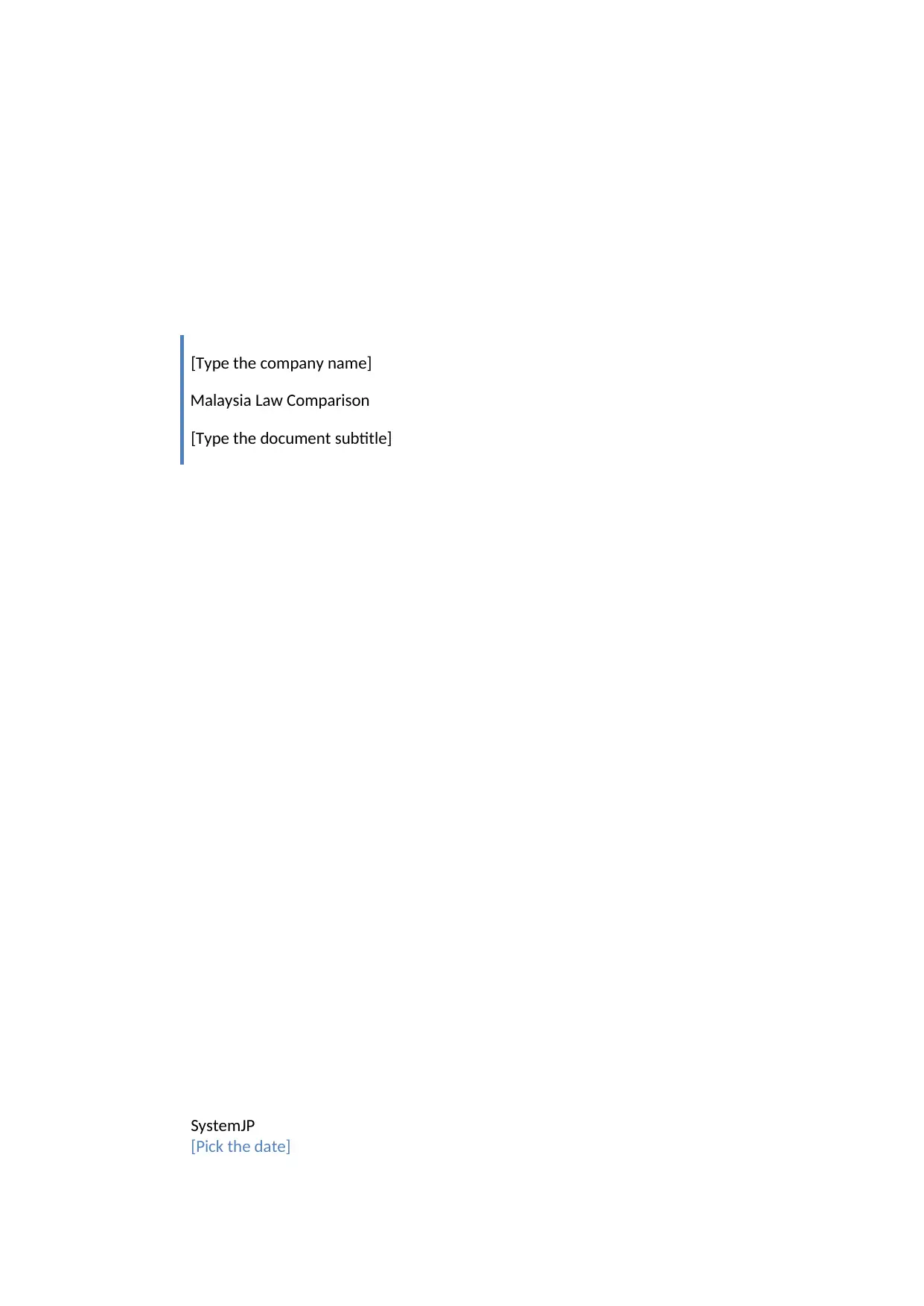
[Type the company name]
Malaysia Law Comparison
[Type the document subtitle]
SystemJP
[Pick the date]
Malaysia Law Comparison
[Type the document subtitle]
SystemJP
[Pick the date]
Paraphrase This Document
Need a fresh take? Get an instant paraphrase of this document with our AI Paraphraser
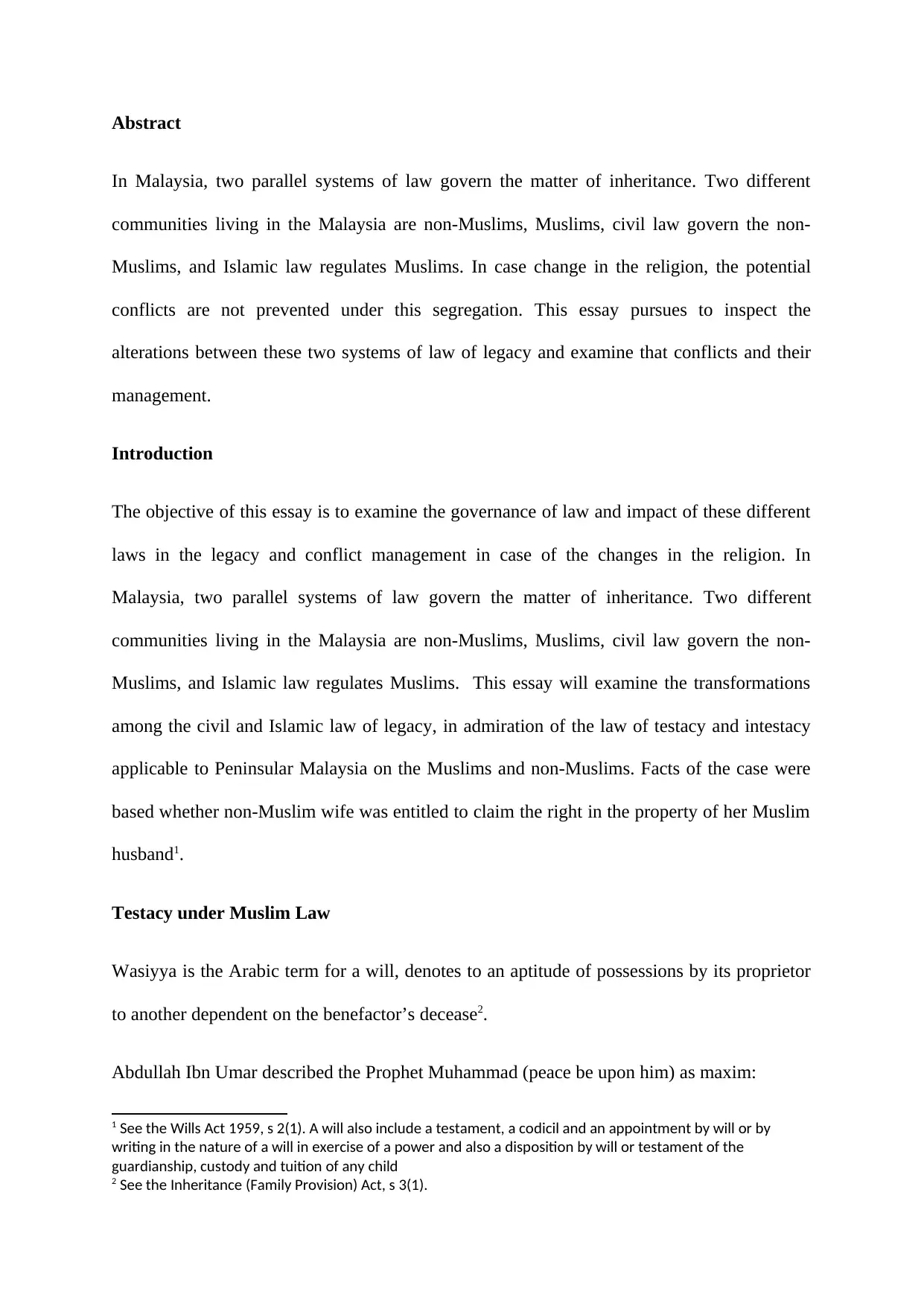
Abstract
In Malaysia, two parallel systems of law govern the matter of inheritance. Two different
communities living in the Malaysia are non-Muslims, Muslims, civil law govern the non-
Muslims, and Islamic law regulates Muslims. In case change in the religion, the potential
conflicts are not prevented under this segregation. This essay pursues to inspect the
alterations between these two systems of law of legacy and examine that conflicts and their
management.
Introduction
The objective of this essay is to examine the governance of law and impact of these different
laws in the legacy and conflict management in case of the changes in the religion. In
Malaysia, two parallel systems of law govern the matter of inheritance. Two different
communities living in the Malaysia are non-Muslims, Muslims, civil law govern the non-
Muslims, and Islamic law regulates Muslims. This essay will examine the transformations
among the civil and Islamic law of legacy, in admiration of the law of testacy and intestacy
applicable to Peninsular Malaysia on the Muslims and non-Muslims. Facts of the case were
based whether non-Muslim wife was entitled to claim the right in the property of her Muslim
husband1.
Testacy under Muslim Law
Wasiyya is the Arabic term for a will, denotes to an aptitude of possessions by its proprietor
to another dependent on the benefactor’s decease2.
Abdullah Ibn Umar described the Prophet Muhammad (peace be upon him) as maxim:
1 See the Wills Act 1959, s 2(1). A will also include a testament, a codicil and an appointment by will or by
writing in the nature of a will in exercise of a power and also a disposition by will or testament of the
guardianship, custody and tuition of any child
2 See the Inheritance (Family Provision) Act, s 3(1).
In Malaysia, two parallel systems of law govern the matter of inheritance. Two different
communities living in the Malaysia are non-Muslims, Muslims, civil law govern the non-
Muslims, and Islamic law regulates Muslims. In case change in the religion, the potential
conflicts are not prevented under this segregation. This essay pursues to inspect the
alterations between these two systems of law of legacy and examine that conflicts and their
management.
Introduction
The objective of this essay is to examine the governance of law and impact of these different
laws in the legacy and conflict management in case of the changes in the religion. In
Malaysia, two parallel systems of law govern the matter of inheritance. Two different
communities living in the Malaysia are non-Muslims, Muslims, civil law govern the non-
Muslims, and Islamic law regulates Muslims. This essay will examine the transformations
among the civil and Islamic law of legacy, in admiration of the law of testacy and intestacy
applicable to Peninsular Malaysia on the Muslims and non-Muslims. Facts of the case were
based whether non-Muslim wife was entitled to claim the right in the property of her Muslim
husband1.
Testacy under Muslim Law
Wasiyya is the Arabic term for a will, denotes to an aptitude of possessions by its proprietor
to another dependent on the benefactor’s decease2.
Abdullah Ibn Umar described the Prophet Muhammad (peace be upon him) as maxim:
1 See the Wills Act 1959, s 2(1). A will also include a testament, a codicil and an appointment by will or by
writing in the nature of a will in exercise of a power and also a disposition by will or testament of the
guardianship, custody and tuition of any child
2 See the Inheritance (Family Provision) Act, s 3(1).
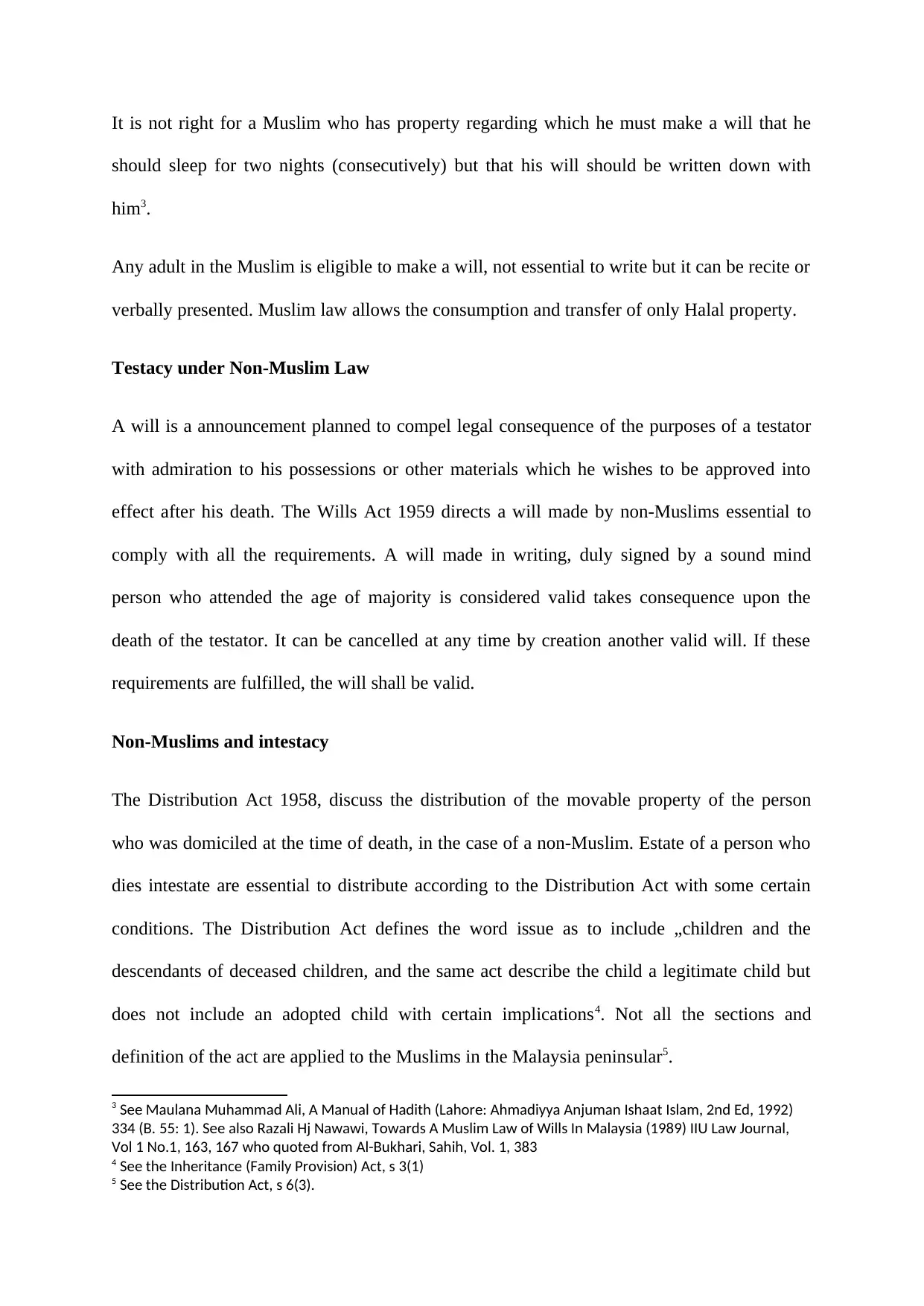
It is not right for a Muslim who has property regarding which he must make a will that he
should sleep for two nights (consecutively) but that his will should be written down with
him3.
Any adult in the Muslim is eligible to make a will, not essential to write but it can be recite or
verbally presented. Muslim law allows the consumption and transfer of only Halal property.
Testacy under Non-Muslim Law
A will is a announcement planned to compel legal consequence of the purposes of a testator
with admiration to his possessions or other materials which he wishes to be approved into
effect after his death. The Wills Act 1959 directs a will made by non-Muslims essential to
comply with all the requirements. A will made in writing, duly signed by a sound mind
person who attended the age of majority is considered valid takes consequence upon the
death of the testator. It can be cancelled at any time by creation another valid will. If these
requirements are fulfilled, the will shall be valid.
Non-Muslims and intestacy
The Distribution Act 1958, discuss the distribution of the movable property of the person
who was domiciled at the time of death, in the case of a non-Muslim. Estate of a person who
dies intestate are essential to distribute according to the Distribution Act with some certain
conditions. The Distribution Act defines the word issue as to include „children and the
descendants of deceased children, and the same act describe the child a legitimate child but
does not include an adopted child with certain implications4. Not all the sections and
definition of the act are applied to the Muslims in the Malaysia peninsular5.
3 See Maulana Muhammad Ali, A Manual of Hadith (Lahore: Ahmadiyya Anjuman Ishaat Islam, 2nd Ed, 1992)
334 (B. 55: 1). See also Razali Hj Nawawi, Towards A Muslim Law of Wills In Malaysia (1989) IIU Law Journal,
Vol 1 No.1, 163, 167 who quoted from Al-Bukhari, Sahih, Vol. 1, 383
4 See the Inheritance (Family Provision) Act, s 3(1)
5 See the Distribution Act, s 6(3).
should sleep for two nights (consecutively) but that his will should be written down with
him3.
Any adult in the Muslim is eligible to make a will, not essential to write but it can be recite or
verbally presented. Muslim law allows the consumption and transfer of only Halal property.
Testacy under Non-Muslim Law
A will is a announcement planned to compel legal consequence of the purposes of a testator
with admiration to his possessions or other materials which he wishes to be approved into
effect after his death. The Wills Act 1959 directs a will made by non-Muslims essential to
comply with all the requirements. A will made in writing, duly signed by a sound mind
person who attended the age of majority is considered valid takes consequence upon the
death of the testator. It can be cancelled at any time by creation another valid will. If these
requirements are fulfilled, the will shall be valid.
Non-Muslims and intestacy
The Distribution Act 1958, discuss the distribution of the movable property of the person
who was domiciled at the time of death, in the case of a non-Muslim. Estate of a person who
dies intestate are essential to distribute according to the Distribution Act with some certain
conditions. The Distribution Act defines the word issue as to include „children and the
descendants of deceased children, and the same act describe the child a legitimate child but
does not include an adopted child with certain implications4. Not all the sections and
definition of the act are applied to the Muslims in the Malaysia peninsular5.
3 See Maulana Muhammad Ali, A Manual of Hadith (Lahore: Ahmadiyya Anjuman Ishaat Islam, 2nd Ed, 1992)
334 (B. 55: 1). See also Razali Hj Nawawi, Towards A Muslim Law of Wills In Malaysia (1989) IIU Law Journal,
Vol 1 No.1, 163, 167 who quoted from Al-Bukhari, Sahih, Vol. 1, 383
4 See the Inheritance (Family Provision) Act, s 3(1)
5 See the Distribution Act, s 6(3).
⊘ This is a preview!⊘
Do you want full access?
Subscribe today to unlock all pages.

Trusted by 1+ million students worldwide
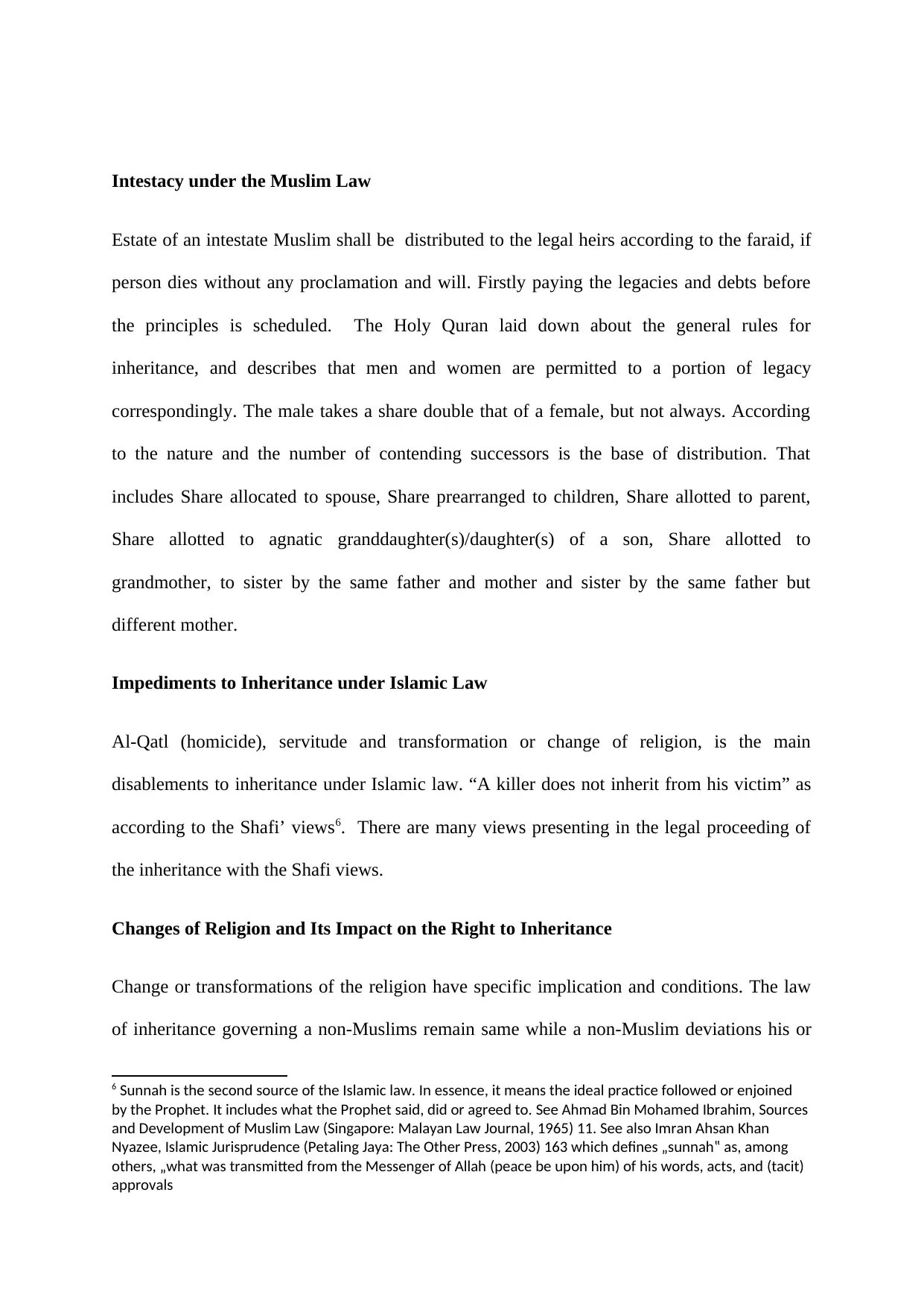
Intestacy under the Muslim Law
Estate of an intestate Muslim shall be distributed to the legal heirs according to the faraid, if
person dies without any proclamation and will. Firstly paying the legacies and debts before
the principles is scheduled. The Holy Quran laid down about the general rules for
inheritance, and describes that men and women are permitted to a portion of legacy
correspondingly. The male takes a share double that of a female, but not always. According
to the nature and the number of contending successors is the base of distribution. That
includes Share allocated to spouse, Share prearranged to children, Share allotted to parent,
Share allotted to agnatic granddaughter(s)/daughter(s) of a son, Share allotted to
grandmother, to sister by the same father and mother and sister by the same father but
different mother.
Impediments to Inheritance under Islamic Law
Al-Qatl (homicide), servitude and transformation or change of religion, is the main
disablements to inheritance under Islamic law. “A killer does not inherit from his victim” as
according to the Shafi’ views6. There are many views presenting in the legal proceeding of
the inheritance with the Shafi views.
Changes of Religion and Its Impact on the Right to Inheritance
Change or transformations of the religion have specific implication and conditions. The law
of inheritance governing a non-Muslims remain same while a non-Muslim deviations his or
6 Sunnah is the second source of the Islamic law. In essence, it means the ideal practice followed or enjoined
by the Prophet. It includes what the Prophet said, did or agreed to. See Ahmad Bin Mohamed Ibrahim, Sources
and Development of Muslim Law (Singapore: Malayan Law Journal, 1965) 11. See also Imran Ahsan Khan
Nyazee, Islamic Jurisprudence (Petaling Jaya: The Other Press, 2003) 163 which defines „sunnah‟ as, among
others, „what was transmitted from the Messenger of Allah (peace be upon him) of his words, acts, and (tacit)
approvals
Estate of an intestate Muslim shall be distributed to the legal heirs according to the faraid, if
person dies without any proclamation and will. Firstly paying the legacies and debts before
the principles is scheduled. The Holy Quran laid down about the general rules for
inheritance, and describes that men and women are permitted to a portion of legacy
correspondingly. The male takes a share double that of a female, but not always. According
to the nature and the number of contending successors is the base of distribution. That
includes Share allocated to spouse, Share prearranged to children, Share allotted to parent,
Share allotted to agnatic granddaughter(s)/daughter(s) of a son, Share allotted to
grandmother, to sister by the same father and mother and sister by the same father but
different mother.
Impediments to Inheritance under Islamic Law
Al-Qatl (homicide), servitude and transformation or change of religion, is the main
disablements to inheritance under Islamic law. “A killer does not inherit from his victim” as
according to the Shafi’ views6. There are many views presenting in the legal proceeding of
the inheritance with the Shafi views.
Changes of Religion and Its Impact on the Right to Inheritance
Change or transformations of the religion have specific implication and conditions. The law
of inheritance governing a non-Muslims remain same while a non-Muslim deviations his or
6 Sunnah is the second source of the Islamic law. In essence, it means the ideal practice followed or enjoined
by the Prophet. It includes what the Prophet said, did or agreed to. See Ahmad Bin Mohamed Ibrahim, Sources
and Development of Muslim Law (Singapore: Malayan Law Journal, 1965) 11. See also Imran Ahsan Khan
Nyazee, Islamic Jurisprudence (Petaling Jaya: The Other Press, 2003) 163 which defines „sunnah‟ as, among
others, „what was transmitted from the Messenger of Allah (peace be upon him) of his words, acts, and (tacit)
approvals
Paraphrase This Document
Need a fresh take? Get an instant paraphrase of this document with our AI Paraphraser
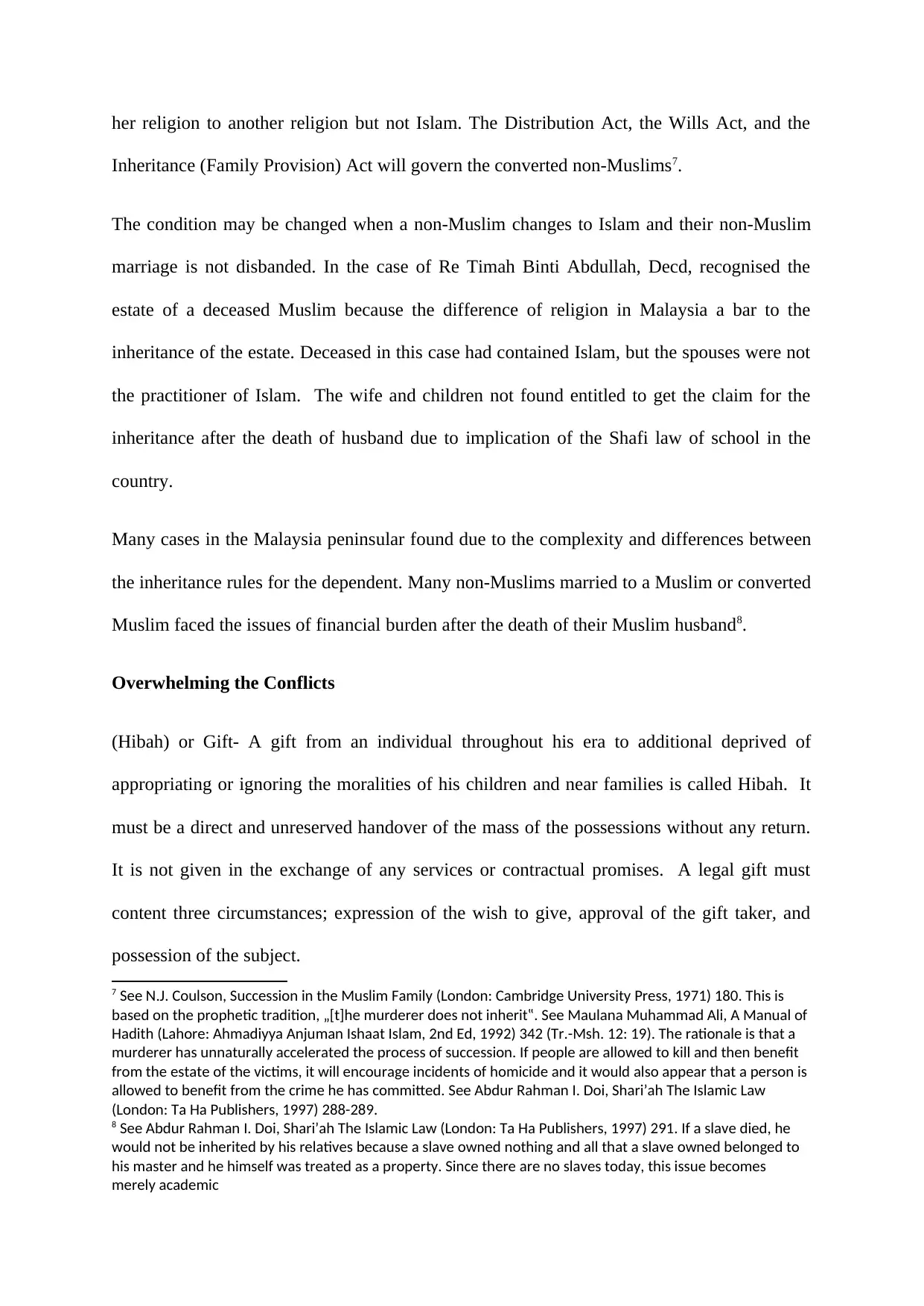
her religion to another religion but not Islam. The Distribution Act, the Wills Act, and the
Inheritance (Family Provision) Act will govern the converted non-Muslims7.
The condition may be changed when a non-Muslim changes to Islam and their non-Muslim
marriage is not disbanded. In the case of Re Timah Binti Abdullah, Decd, recognised the
estate of a deceased Muslim because the difference of religion in Malaysia a bar to the
inheritance of the estate. Deceased in this case had contained Islam, but the spouses were not
the practitioner of Islam. The wife and children not found entitled to get the claim for the
inheritance after the death of husband due to implication of the Shafi law of school in the
country.
Many cases in the Malaysia peninsular found due to the complexity and differences between
the inheritance rules for the dependent. Many non-Muslims married to a Muslim or converted
Muslim faced the issues of financial burden after the death of their Muslim husband8.
Overwhelming the Conflicts
(Hibah) or Gift- A gift from an individual throughout his era to additional deprived of
appropriating or ignoring the moralities of his children and near families is called Hibah. It
must be a direct and unreserved handover of the mass of the possessions without any return.
It is not given in the exchange of any services or contractual promises. A legal gift must
content three circumstances; expression of the wish to give, approval of the gift taker, and
possession of the subject.
7 See N.J. Coulson, Succession in the Muslim Family (London: Cambridge University Press, 1971) 180. This is
based on the prophetic tradition, „[t]he murderer does not inherit‟. See Maulana Muhammad Ali, A Manual of
Hadith (Lahore: Ahmadiyya Anjuman Ishaat Islam, 2nd Ed, 1992) 342 (Tr.-Msh. 12: 19). The rationale is that a
murderer has unnaturally accelerated the process of succession. If people are allowed to kill and then benefit
from the estate of the victims, it will encourage incidents of homicide and it would also appear that a person is
allowed to benefit from the crime he has committed. See Abdur Rahman I. Doi, Shari’ah The Islamic Law
(London: Ta Ha Publishers, 1997) 288-289.
8 See Abdur Rahman I. Doi, Shari’ah The Islamic Law (London: Ta Ha Publishers, 1997) 291. If a slave died, he
would not be inherited by his relatives because a slave owned nothing and all that a slave owned belonged to
his master and he himself was treated as a property. Since there are no slaves today, this issue becomes
merely academic
Inheritance (Family Provision) Act will govern the converted non-Muslims7.
The condition may be changed when a non-Muslim changes to Islam and their non-Muslim
marriage is not disbanded. In the case of Re Timah Binti Abdullah, Decd, recognised the
estate of a deceased Muslim because the difference of religion in Malaysia a bar to the
inheritance of the estate. Deceased in this case had contained Islam, but the spouses were not
the practitioner of Islam. The wife and children not found entitled to get the claim for the
inheritance after the death of husband due to implication of the Shafi law of school in the
country.
Many cases in the Malaysia peninsular found due to the complexity and differences between
the inheritance rules for the dependent. Many non-Muslims married to a Muslim or converted
Muslim faced the issues of financial burden after the death of their Muslim husband8.
Overwhelming the Conflicts
(Hibah) or Gift- A gift from an individual throughout his era to additional deprived of
appropriating or ignoring the moralities of his children and near families is called Hibah. It
must be a direct and unreserved handover of the mass of the possessions without any return.
It is not given in the exchange of any services or contractual promises. A legal gift must
content three circumstances; expression of the wish to give, approval of the gift taker, and
possession of the subject.
7 See N.J. Coulson, Succession in the Muslim Family (London: Cambridge University Press, 1971) 180. This is
based on the prophetic tradition, „[t]he murderer does not inherit‟. See Maulana Muhammad Ali, A Manual of
Hadith (Lahore: Ahmadiyya Anjuman Ishaat Islam, 2nd Ed, 1992) 342 (Tr.-Msh. 12: 19). The rationale is that a
murderer has unnaturally accelerated the process of succession. If people are allowed to kill and then benefit
from the estate of the victims, it will encourage incidents of homicide and it would also appear that a person is
allowed to benefit from the crime he has committed. See Abdur Rahman I. Doi, Shari’ah The Islamic Law
(London: Ta Ha Publishers, 1997) 288-289.
8 See Abdur Rahman I. Doi, Shari’ah The Islamic Law (London: Ta Ha Publishers, 1997) 291. If a slave died, he
would not be inherited by his relatives because a slave owned nothing and all that a slave owned belonged to
his master and he himself was treated as a property. Since there are no slaves today, this issue becomes
merely academic
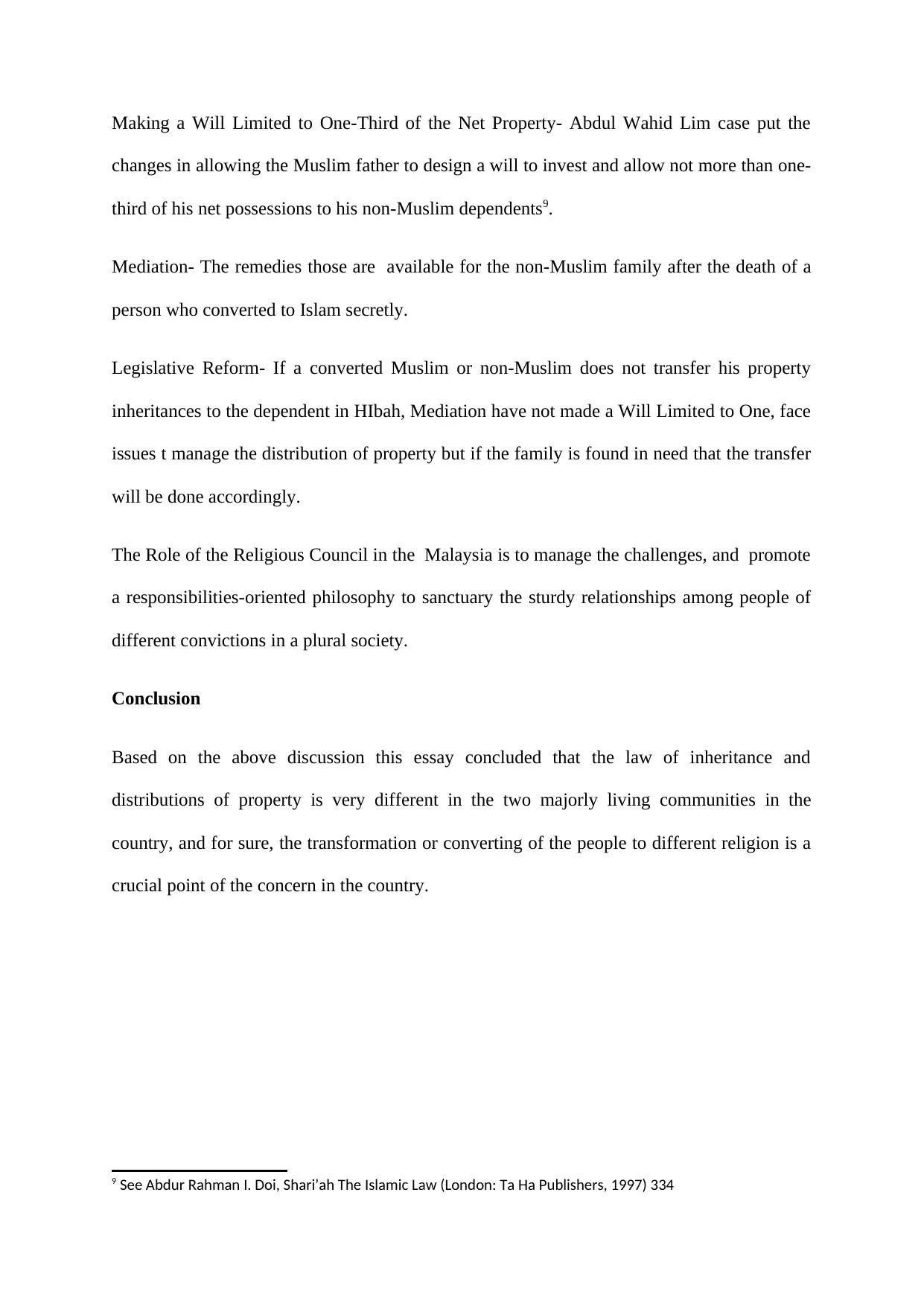
Making a Will Limited to One-Third of the Net Property- Abdul Wahid Lim case put the
changes in allowing the Muslim father to design a will to invest and allow not more than one-
third of his net possessions to his non-Muslim dependents9.
Mediation- The remedies those are available for the non-Muslim family after the death of a
person who converted to Islam secretly.
Legislative Reform- If a converted Muslim or non-Muslim does not transfer his property
inheritances to the dependent in HIbah, Mediation have not made a Will Limited to One, face
issues t manage the distribution of property but if the family is found in need that the transfer
will be done accordingly.
The Role of the Religious Council in the Malaysia is to manage the challenges, and promote
a responsibilities-oriented philosophy to sanctuary the sturdy relationships among people of
different convictions in a plural society.
Conclusion
Based on the above discussion this essay concluded that the law of inheritance and
distributions of property is very different in the two majorly living communities in the
country, and for sure, the transformation or converting of the people to different religion is a
crucial point of the concern in the country.
9 See Abdur Rahman I. Doi, Shari’ah The Islamic Law (London: Ta Ha Publishers, 1997) 334
changes in allowing the Muslim father to design a will to invest and allow not more than one-
third of his net possessions to his non-Muslim dependents9.
Mediation- The remedies those are available for the non-Muslim family after the death of a
person who converted to Islam secretly.
Legislative Reform- If a converted Muslim or non-Muslim does not transfer his property
inheritances to the dependent in HIbah, Mediation have not made a Will Limited to One, face
issues t manage the distribution of property but if the family is found in need that the transfer
will be done accordingly.
The Role of the Religious Council in the Malaysia is to manage the challenges, and promote
a responsibilities-oriented philosophy to sanctuary the sturdy relationships among people of
different convictions in a plural society.
Conclusion
Based on the above discussion this essay concluded that the law of inheritance and
distributions of property is very different in the two majorly living communities in the
country, and for sure, the transformation or converting of the people to different religion is a
crucial point of the concern in the country.
9 See Abdur Rahman I. Doi, Shari’ah The Islamic Law (London: Ta Ha Publishers, 1997) 334
⊘ This is a preview!⊘
Do you want full access?
Subscribe today to unlock all pages.

Trusted by 1+ million students worldwide
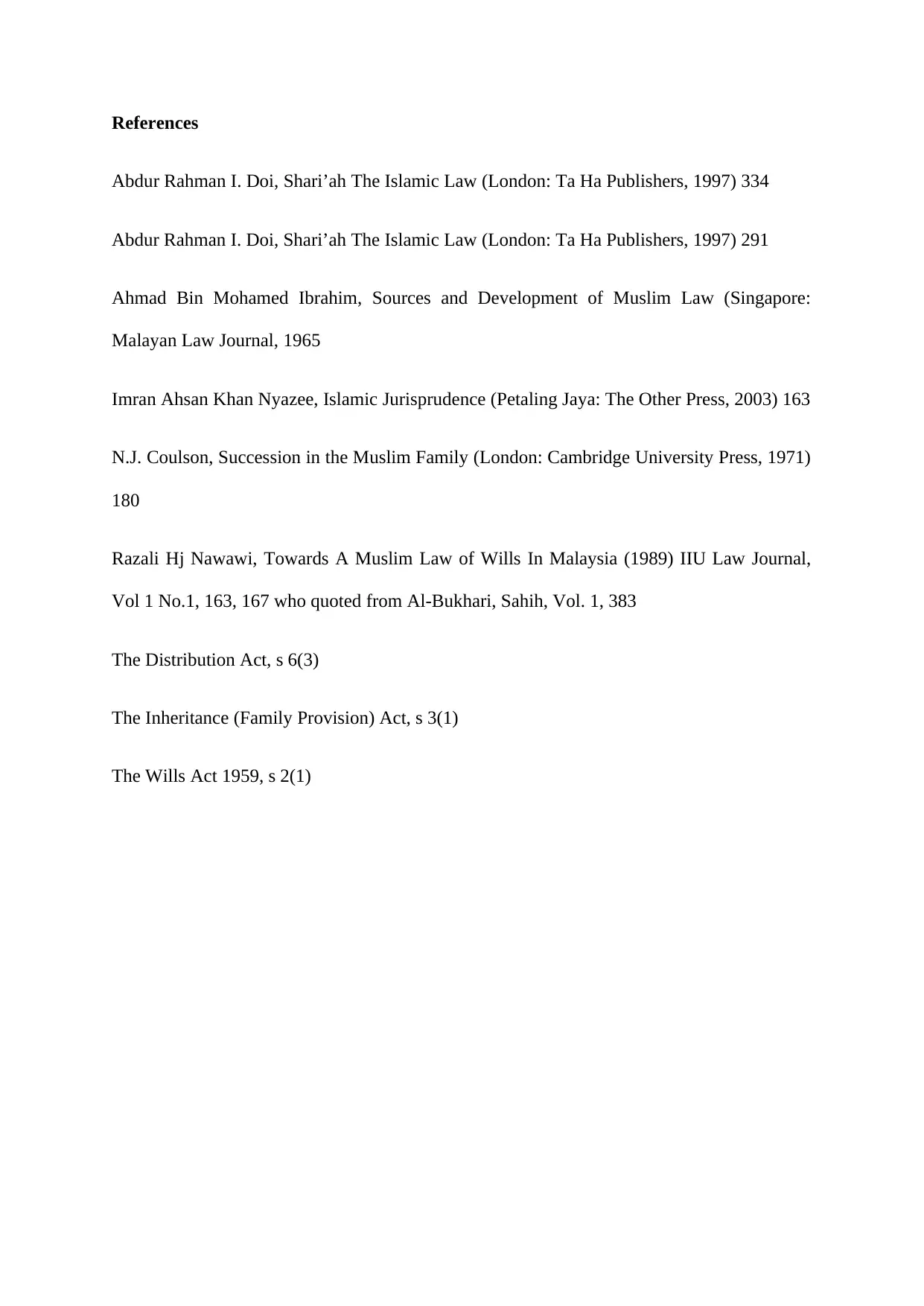
References
Abdur Rahman I. Doi, Shari’ah The Islamic Law (London: Ta Ha Publishers, 1997) 334
Abdur Rahman I. Doi, Shari’ah The Islamic Law (London: Ta Ha Publishers, 1997) 291
Ahmad Bin Mohamed Ibrahim, Sources and Development of Muslim Law (Singapore:
Malayan Law Journal, 1965
Imran Ahsan Khan Nyazee, Islamic Jurisprudence (Petaling Jaya: The Other Press, 2003) 163
N.J. Coulson, Succession in the Muslim Family (London: Cambridge University Press, 1971)
180
Razali Hj Nawawi, Towards A Muslim Law of Wills In Malaysia (1989) IIU Law Journal,
Vol 1 No.1, 163, 167 who quoted from Al-Bukhari, Sahih, Vol. 1, 383
The Distribution Act, s 6(3)
The Inheritance (Family Provision) Act, s 3(1)
The Wills Act 1959, s 2(1)
Abdur Rahman I. Doi, Shari’ah The Islamic Law (London: Ta Ha Publishers, 1997) 334
Abdur Rahman I. Doi, Shari’ah The Islamic Law (London: Ta Ha Publishers, 1997) 291
Ahmad Bin Mohamed Ibrahim, Sources and Development of Muslim Law (Singapore:
Malayan Law Journal, 1965
Imran Ahsan Khan Nyazee, Islamic Jurisprudence (Petaling Jaya: The Other Press, 2003) 163
N.J. Coulson, Succession in the Muslim Family (London: Cambridge University Press, 1971)
180
Razali Hj Nawawi, Towards A Muslim Law of Wills In Malaysia (1989) IIU Law Journal,
Vol 1 No.1, 163, 167 who quoted from Al-Bukhari, Sahih, Vol. 1, 383
The Distribution Act, s 6(3)
The Inheritance (Family Provision) Act, s 3(1)
The Wills Act 1959, s 2(1)
1 out of 7
Your All-in-One AI-Powered Toolkit for Academic Success.
+13062052269
info@desklib.com
Available 24*7 on WhatsApp / Email
![[object Object]](/_next/static/media/star-bottom.7253800d.svg)
Unlock your academic potential
Copyright © 2020–2025 A2Z Services. All Rights Reserved. Developed and managed by ZUCOL.